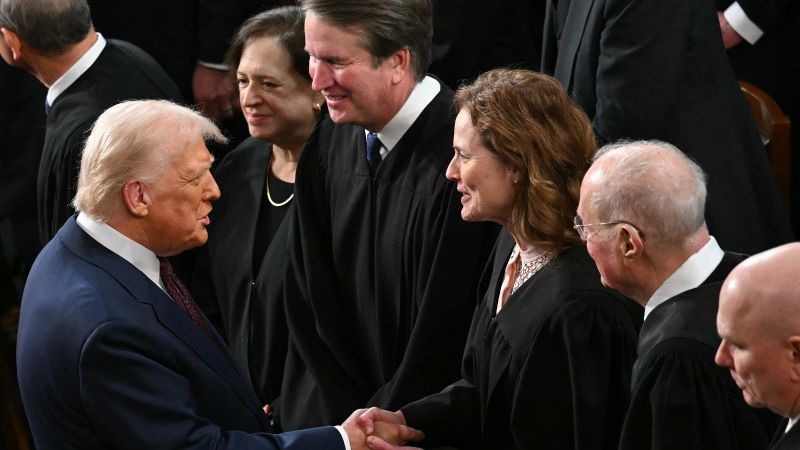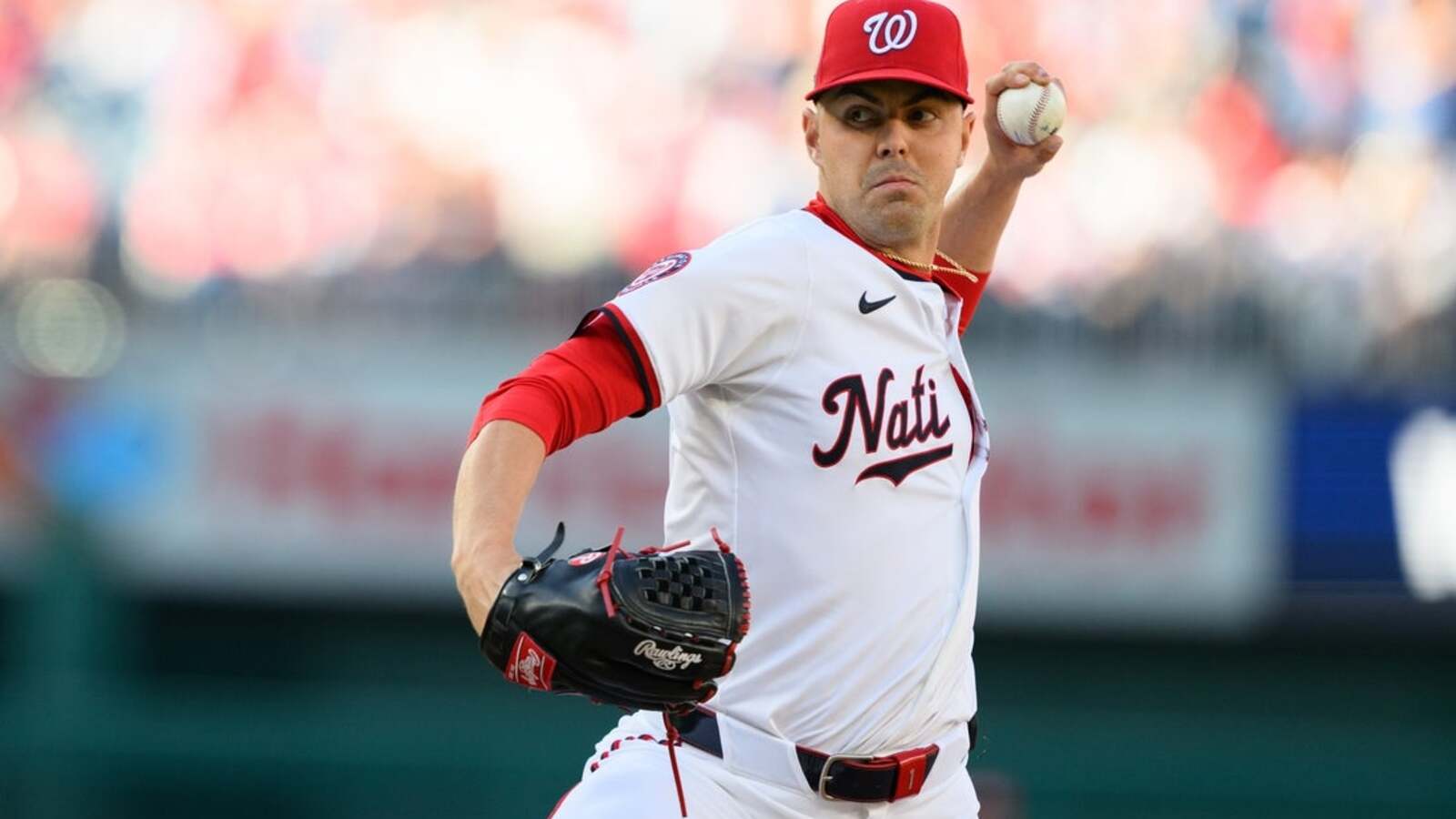
As Trump administration lawyers have intensified their appeals to the Supreme Court, they’re relying on recurring tropes. “Only this Court can end the interbranch power grab,” the lawyers wrote as they urged the justices to reverse a California judge’s order requiring the reinstatement of probationary federal workers. “Only this Court can right the ship – and the time to do so is now,” they said as they appealed a separate order preserving Department of Education teaching-training grants.
And last Friday, when the Trump legal team appealed a temporary restraining order in the controversy over President Donald Trump’s use of the Alien Enemies Act to deport alleged members of a Venezuelan gang, lawyers wrote , “Only this Court can stop rule-by-TRO from further upending the separation of powers – the sooner, the better.” With each successive case, the administration’s legal team has also ratcheted up the emphasis on presidential control. In the appeal of an order from US District Court Judge James Boasberg in the deportation of Venezuelan nationals, the lawyers have invoked national security interests and wartime powers.

The Trump legal team has repeatedly expressed a sense of urgency (Boasberg’s decision “cries out for this Court’s intervention”) and portrayed lower court judges as generating upheaval across the country (“orders have sown chaos”). They’ve also tailored their arguments to key justices, seizing on an earlier case in which Trump lost but had the backing of four members of the bench, just one short of a majority. They have repeated the dissenting phrasing of Justice Samuel Alito, and the three other justices on the right wing who joined him, to underscore Trump’s latest pleas.
Separately, the lawyers have conspicuously referred to the writings of a fifth conservative, Justice Amy Coney Barrett. The Republican-controlled Congress has let Trump dash through his agenda, even as he has usurped congressional decisions on how agencies should spend funds. That means the president’s ability to dissolve America’s constitutional order will ultimately rest with the judiciary and final word at the nine-member Supreme Court.
For the most part, the pending Trump appeals have reached the court at the earliest stage of any litigation. As lower court judges have begun hearing lawsuits challenging Trump’s many daring initiatives, they have put many initiatives on hold while the merits of the cases are tested. But the administration has implored the justices to let it enforce the new policies before legal challenges are resolved.
Two justices have publicly voiced caution regarding the sudden turmoil. Speaking at Georgetown University Law Center on Friday, liberal Justice Sonia Sotomayor said she was worried that “standards are being changed.” She added : “Once norms are broken then you’re shaking some of the foundation of the rule of law.
” Earlier in March, Chief Justice John Roberts publicly countered Trump’s threats of impeaching judges who ruled against the administration. “For more than two centuries,” Roberts said in his March 18 statement, “it has been established that impeachment is not an appropriate response to disagreement concerning a judicial decision. The normal appellate review process exists for that purpose.
” Echoing Alito Administration lawyers are mainly echoing the voices of the four most conservative justices, especially as they dissented in a March 5 controversy over Trump’s attempt to freeze billions of dollars in US foreign aid appropriated for global food, health and other humanitarian purposes. US District Court Judge Amir Ali had ordered the disbursements to continue while litigation proceeded on the challenge to the Trump effort. A five-justice Supreme Court majority spurned the administration’s plea to reverse Ali and keep the billions of dollars of aid frozen.
Alito, joined by Justices Clarence Thomas, Neil Gorsuch and Brett Kavanaugh, strongly dissented in a warning shot to judges who might try to derail the administration. They characterized Ali’s action as “judicial hubris.” Alito denounced the judge for operating with “unchecked power,” “blithely” disregarding administration arguments and failing to reckon with key precedent before “plowing ahead.
” In the Trump administration’s appeals attempting to reinstate a freeze on Department of Education funds and enforce its dismissal the of probationary employees, government lawyers lift such Alito phrasing. They said lower court judges had “plowed” through legal principles, engaged in a “power grab,” and “blithely” discounted administration arguments. Appeal to Barrett Yet even if Alito, Thomas, Gorsuch and Kavanaugh continue to side with the Trump administration, the group needs a fifth vote for a majority.
Submissions from the administration and outside groups backing its efforts have repeatedly cited Barrett, who was Trump’s third appointee in his first term (after Gorsuch and Kavanaugh). They particularly refer to her prior statements to reinforce their opposition to individual district court judges imposing nationwide orders against Trump policy. In 2023, for example, she joined an opinion that said lower court judges’ powers are essentially limited to “render(ing) a judgment or decree upon the rights of litigants,” which to the administration would suggest universal injunctions should be off-limits.
Barrett’s writings in this area of the law pale when compared to those of, for example, Gorsuch, who suggested in a 2024 case that it was time to “retire” universal injunctions. The Trump administration has nonetheless added Barrett citations for the argument that various nationwide injunctions imposed by lower court judges against the administration should be suspended. They cite her view that one consideration for lifting an injunction would be if justices were inclined to grant review on the merits of the dispute.
Barrett has also written that postponing the effect of an injunction would “minimize harm while an appellate court deliberates.” A question of ‘unchecked power’ Since Trump began his second term on January 20, after Roberts administered the oath at the US Capitol, the president has signed dozens of executive orders to fire workers, withhold public funds and overhaul immigration policy. Those initiatives were just as quickly challenged in federal courts.
Multiple lawsuits now at the Supreme Court on preliminary appeals center on Trump’s effort to end birthright citizenship, as well as on the deportations of Venezuelan nationals, cancellation of Department of Education grants and the firing of some 16,000 probationary employees. In all of these cases, US district court judges blocked the Trump moves and imposed injunctions that extend throughout the country, which Trump lawyers said have reached “epidemic proportions.” “‘Does a single district-court judge who likely lacks jurisdiction have the unchecked power to compel the Government of the United States to pay out (and probably lose forever) millions in taxpayer dollars?” Trump lawyers wrote in the Department of Education dispute, quoting some of Alito’s language from the USAID case.
Justices across the spectrum have criticized such sweeping injunctions over the years, but a majority never was sufficiently infuriated to stop them, through prior Republican and Democratic administrations. At this stage in the Trump litigation, much of the focus turns on such questions of process. Some of the filings, however, hint at where the administration may go on larger substantive issues.
In the dispute over alleged members of the Venezuelan gang Tren de Aragua, scores of whom have already been deported to El Salvador and imprisoned there, administration lawyers cite a 2018 decision by Roberts that upheld Trump’s first-term travel ban on majority-Muslim countries. Trump’s lawyers refer to that ruling, Trump v. Hawaii , one of Trump’s most significant early court victories, for the proposition that the president has “broad discretion” for determining foreign threats.
And as they closed their recent filing in the Venezuelan deportation challenge that has provoked so much of Trump’s ire, they again cited the 2018 ruling as they declared, “This case raises paramount questions about the President’s constitutional and statutory authority to protect the Nation against elements of a designated foreign terrorist organization. ..
. Such national-security questions are quintessential issues warranting this Court’s attention.”.















